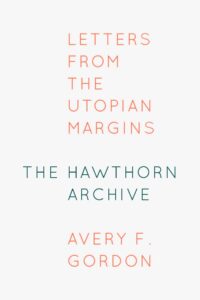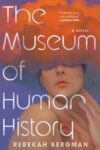
[Fordham University Press; 2017]
The Hawthorn Archive: Letters from the Utopian Margins is a polyglossic tome that, through its writing on various social struggles against slavery, capitalism, and other forms of authoritarian control, encourages the sustained practice of developing a socio-political consciousness. Archivist and sociologist Avery F. Gordon leads the reader through pages of documents — many of which recount instances of revolutionary thinking that have been excluded from the Western canon due to the marginal positionality of their authors and/or subjects. From the Diggers, an anarchist group in seventeenth-century England struggling for the commons, to abolitionism and animism, The Hawthorn Archive explores the utopian margins and revolutionary thinking that reside outside of the racialized historiography and narrow discourse of the Western conception of utopia. It is a book that defies genre in its blend of fact and fiction, and its creative approach to critical thinking.
As the reader first enters the archive, it is made clear that “utopian”, as Gordon conceptualizes it, doesn’t emerge from the lineage of Thomas More and Ursula K Leguin, but rather operates as a practice for the present — a way of coming to terms with our current conditions and developing strategies of resistance. It is about the communal ways in which people gather against oppressive systems of power. In one of the “file notes” that preface each document Gordon writes: “If there is one methodological orientation that most characterizes the work of the Hawthorn Archive, its collaborators, and its friends, it is the attempt to excavate, produce, display, and properly value subjugated knowledge”. This archive is a collection of fugitive thinking that has been marginalized and discredited by the institutions of official knowledge production. Referencing Foucault’s “insurrection of subjugated knowledges”, which he defines as “contents that have been buried or masked in functional coherences or formal systematizations”, the Hawthorn Archive bolsters and creates a space for repressed knowledges that come from less normative or hegemonic positions of class or race and, as such, have been neglected.
Focusing on Marxist critical theory and black radical traditions, it is an undisciplined compilation that offers those who engage with it several different points of entry. In 400 pages, the book employs a form of experimental critique which subverts our traditional understanding of criticism by expanding in multidisciplinary directions. It disrupts a linear conventional critique with prison letters, photographs, and other ephemera – moving the reader from epistolary exchanges between friends to imaginary cartographies developed through artistic collaborations. The varied collection of archival material allows for a constant shifting of registers contained within the copious files: the letter offers a space to try out ideas informally with friends, the interview cultivates dialogic spontaneous thinking, the essay a space for more structured thought. The files contained within the book foster a radical thinking that pushes the reader to question the forms and literature we have been handed, how they have been integrated into our social fabric, and how we might activate an epistemological disruption.
In the fourth section of the book, titled “perception of the subjectivity of the so-called object”, two collaborators send Gordon a spoon from Kassel. It is a relic they found on a slope of rubble and debris from WWII caused by the weapons production of the company Henschel and “made possible by thousands of forced laborers”. To this submission Gordon responds:
“Dear Natascha and Pola,
I hope this note finds you both well. We’re busy at the archive, as we always are when war, misery, and corruption intensify and people can’t take it or fight it anymore and run away. The protests and strikes against the war mongering in the east and the austerity and border clampdowns in the north have provoked a goodly number to secede and then they often end up on our doorsteps, especially when they turn against the craven bankers. Some of these folks you would know, but there are others new to rebellion and to self-governance coming from all over now.”
Here, the informal creative writing moves away from the tone of the critical essays that have come before it – extending a refreshing angle on the subject, a different frame emerges. Through this friendly epistolary exchange, Gordon also further develops the speculative imagination of the book, which at once feels removed and so adjacent to concrete realities. There is a moment of questioning what is real and what is fictitious. There is a sense of warmth in collectivity and friendship as armor against the unjust forces of war and capitalism. Manifesto ensconced in casual conversational exchange.
To give a complete overview of The Hawthorn Archive seems an impossible feat. To write a review that would encompass the whole of the collection is as daunting as summarizing the contents of any archive. Any single excerpt proves an inadequate metonym as each file differs so wildly from the next, each piece adding a new perspective. Take for example the passage above, with its informal epistolary register, in comparison with this:
“Marcuse is aware of the strain he’s putting on the meaning of the word biology to use it as he does: the word is always followed by a question mark. There’s no mistaking the antipositivism in Marcuse’s organs for the alternative, a hallmark of the older tradition of utopian socialism, notably its feminist strand, that Marx and Engles so famously sought to supercede. And Marcuse certainly reverses Marx and Engel’s logic, which required that the path to socialism proceed from utopia to science. It will, it must, work the other way around, Marcuse suggests.”
This passage is excerpted from Section I titled “the scandal of the qualitative difference” which “takes its name from a phrase the philosopher Herbert Marcuse used — “the qualitative difference” — to define the nature of the deep systematic change he associated with refusal, liberation, and the growth of “organs for the alternative”. This section also includes a large transcription of a conversation on friendship — defined in this text as an alignment, collaborative understanding, camaraderie, or solidarity. The reader observes the same themes emerging throughout the book from different angles, and with each slight shift of tone, a new relationship to the subject is offered.
As the reader flips through and reads individual scattered files or settles in to read the book as a monograph, it becomes clear that each form of reading proves as fruitful as the next because it invites multiple intelligences, its varied documentation extending out in manifold directions. The synthesis between critical theory and creative writing allows for a more developed understanding of the complexities and facets of utopian thinking. The range between epistolary exchange, interview, critical analysis, and various visual approaches — from film stills to photocopied notices offering rewards for runaway slaves — results in a constant shifting of registers which in turn allows space for a generative reading in which the reader can consider a new form of critical thinking. “It might best be conceived as an idiosyncratic methodology for a research-based writing practice,” in which creative and critical rhetoric merge and reach for a novel approach, one that functions outside of the linear canon from which subjugated knowledges have traditionally been excluded.
Naming this book an archive brings attention to the gaps within the history of archival practice – the unheard voices. It brings to mind Saidiya Hartman’s essay “Venus in Two Acts”, as well as the Nourbese Philips Zong! — both texts that address the violence enacted through the archive, the voices left out and rendered mute. This text takes a step in the direction of correcting the injustice by archiving stories that have historically been excluded. In the “Reprise” of “Venus in Two Acts”, Hartman writes that she wanted to trespass the boundaries of the archive describing her “strategy for disordering and transgressing the protocols of the archive and the authority of its statements…which enabled [her] to augment and intensify its fictions”. In disrupting the format of the archive, both Hartman and Gordon gesture towards what Eve Sedgwick calls a “reparative reading” of our subsumed epistemologies — a hermeneutic for a style of critique that seeks to repair the damage of prejudice and violence rather than perpetuating further practices of abuse.
In the blurb on the back of the book, Hartman writes that “The Hawthorn Archive opens a path for thinking in its extended engagement with the documents and ephemera of utopian thought”. The act of engaging with this archive becomes extensive, at times exhaustive, in its sheer dense and lengthy composition. Much mimicking the process of interacting with a physical archive, albeit without all the dust and piles of boxes, it is easy to feel a sense of drowning within the pages of this book. Overwhelmed at making one’s way through the endless files, the only thing to be done is to take a deep breath and dive in, knowing that the labor of digging will result in a rewarding find, a nugget that proves to crystallize in a deeper understanding. There is an implicit structure formed in a naming, and calling this book an archive also bestows a formalism, recalling the etymology which stems from the Greek arkhē which means ‘government’; but here the authority is then dismantled by the form of the book itself. By neglecting the formalities of the structure, by disrupting the format, the power structure implicit in the word is troubled and criticized. This is not an ordinary archive: it is an archive of content usually neglected by archivists, it is an imaginary archive, and a speculative research-based practice.
The Hawthorn Archive advocates for a turn in critical thinking which integrates a creative dimension. Writer and theorist Irit Rogoff, who has promoted the incorporation of practice-based research in doctoral education, says that “to advocate for creative practices of knowledge is to advocate for its undisciplining. It is to argue that it needs to be viewed as an a-signifying practice that produces ruptures and affects within the map of knowledge”. The Hawthorn Archive does just that — it breaks open the structures of knowledge by disorienting the academic reader so accustomed to a normative canon. It also performs as an undisciplining, by bringing together a sociologist — who, at times, writes like a poet — with collaborators from different fields. By removing the authority of a singular voice through collaborative writing and curating, the importance is then placed on the collective and allows for a more polyphonic and extensive study of the subject. As Barthes wrote in his seminal text “Death of the Author”: “Literature is that neuter, that composite, that oblique into which every subject escapes, the trap where all identity is lost, beginning with the very identity of the body that writes”. It seems apt that to incorporate the unheard stories of the archive, to address the lost voices, it would take the clamor of many and not the authority of one. This is a book that believes in the socially committed capacity of art and intellectual discourse to address idioms of systemic power — be it within the academic institution or outside of it — in order to disrupt and reconceive them.
Emma Gomis is a Catalan American poet, essayist, editor and researcher. She is the cofounder of Manifold Press. Her texts have been published in DenverQuarterly, The Brooklyn Rail, Entropy, and Asymptote among others and her chapbook Canxona is forthcoming from b l u s h lit. In 2021 she cowrote a chapbook with Anne Waldman Goslings to Prophecy which was published by The Lune. She was selected by Patricia Spears Jones as The Poetry Project’s 2020 Brannan Poetry Prize winner. She holds an M.F.A. in Creative Writing & Poetics from Naropa’s Jack Kerouac School of Disembodied Poetics, where she was also a fellowship recipient, and is currently pursuing a Ph.D. in criticism and culture at the University of Cambridge.
This post may contain affiliate links.







